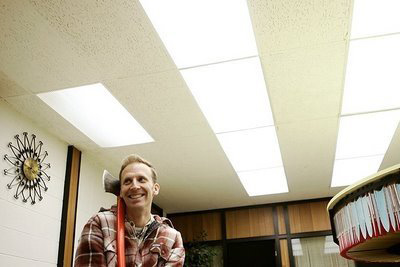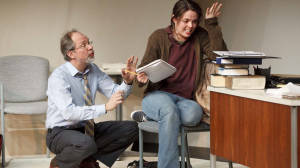The issues explored in David Mamet’s controversial play on political correctness, education, and power politics, Oleanna, stand up to the test of time.
They have as much resonance today as they did when it opened to audiences in 1992.
The only problem is, while showcasing some of Mamet’s best writing, the play is ultimately mired by his inability to transcend his own personal prejudices.
Almost twelve years after directing the show myself, I went to see Soulpepper’s remount currently playing at The Young Centre. This isn’t a review, so I won’t be commenting on the production.
What stood out to me this time around, was just how flawed a play Oleanna is.
This comes partially from a great disappointment at how well the play begins, and how badly it finishes.
The first act has the promise of brilliance. Carol, a confused and somewhat neurotic college student, appears in the office of John, her professor, looking desperately for answers.
She is failing, and she can’t understand why. John has little time for her at first, more interested in answering a phone that rings incessantly and preoccupied with the impending purchase of his dream house.
John is the archetypal verbose intellectual, who challenges all excepted norms in his academic life, while happily accepting the spoils, both power and money, the profession rains upon him.
John is a wholly actualized character. Carol is not.
John’s great strengths and weaknesses are laid bare.
He is arrogant and snobby, and yet he makes the important decision to try and reach Carol in a less than orthodox way
If we’re going to take off the Artificial Stricture, of “Teacher,” and “Student,” why should my own problems be any more a mystery than your own?
He then goes on to talk about his predictable, upper-middle class dilemmas in a typically arrogant and paternal way.
Nice house, close to the private school… (He continues making his note.) … We were talking of economic betterment (CAROL writes in her notebook.) … I was thinking of the School Tax. (He continues writing.) (To himself:) … where is it written that I have to send my child to public school. … Is it a law that I have to improve the City Schools at the expense of my own interest? And, is this not simply The White Man’s Burden? Good. And (Looks up to CAROL) … does this interest you?
But despite his great flaws, he opens up a compelling discussion on the value of post-secondary education.
We shove this book at you, we say read it. Now, you say you’ve read it? I think that you’re lying. I’ll grill you, and when I find you’ve lied, you’ll be disgraced, and your life will be ruined. It’s a sick game. Why do we do it? Does it educate? In no sense. Well, then, what is higher education? It is something-other-than-useful.
When Carol challenges John on how he can disparage education, to those who have in many cases, “over-come great obstacles to get here,” he replies that it is his job to challenge and provoke thought in his students. Carol seems unable to grasp this idea.
So whether you like him or his ideas, John is a real character, at least somewhat worthy of our empathy.
Carol is less a character than a straw woman. Mamet uses her, simply as a vehicle, to drive Oleanna towards a conclusion that confirms his suspicions: that political correctness is used by feminists, in a witch hunt, that has as its ultimate purpose the removal of humanity from human interaction.
Whether you believe this or not doesn’t matter, because Mamet makes his case so poorly.
In the first act Carol is written, rather one-dimensionally, as seemingly inarticulate, desperate, angry, and completely lacking self-esteem.
Nobody tells me anything. And I sit there … in the corner. In the back. And everybody’s talking about “this” all the time. And “concepts,” and “precepts” and, and, and, and, and, WHAT IN THE WORLD ARE YOU TALKING ABOUT? And I read your book. And they said, “Fine, go in that class.” Because you talked about responsibility to the young. I DON’T KNOW WHAT IT MEANS AND I’M FAILING…

Simon Rice and Sara Wood also staged their own Oleanna in the pre-Praxis days with Bloody Theatre in 1998
Mamet reveals nothing of where she is coming from or what her background is. If she has a life outside of being a failing student, we’re not privy to it.
Remarkably when Carol returns in the second and third act, this time on decidedly less friendly terms, she has developed great self-confidence and a sophisticated vocabulary.
… It is a sexist remark, and to overlook it is to countenance continuation of that method of thought. It’s a remark…
… What gives you the right. Yes. To speak to a woman in your private… Yes. Yes. I’m sorry. I’m sorry. You feel yourself empowered … you say so yourself. To strut. To posture. To “perform.” To “Call me in here…” Eh? You say that higher education is a joke. And treat it as such, you treat it as such. And confess to a taste to play the Patriarch in your class. To grant this. To deny that. To embrace your students.
Of course we still have no idea why Carol is doing this, or where she is coming from, only that she is single mindedly bent on John’s destruction.
I don’t care what you feel. Do you see? DO YOU SEE? You can’t do that anymore. You. Do. Not. Have. The. Power. Did you misuse it? Someone did. Are you part of that group? Yes. Yes. You Are. You’ve done these things. And to say, and to say, “Oh. Let me help you with your problem…
This is the problem with Oleanna. The questions it asks and tries to address are fascinating, and without easy answers. But Mamet tries to give us easy answers in his conclusion.
He wants us to feel that John is righteous and that Carol is a monster, and he succeeds.
But are we any wiser for it?
]]>“Many teachers think of children as immature adults. It might lead to better and more ‘respectful teaching’ if we thought of adults as atrophied children.” Keith Johnstone.
Image:
Sound:
This is better if you minimize the window and imagine you’re listening to the radio as a child with your grandfather late at night when you’re supposed to be in bed.
______________________________________________________________________

David Tompa directed TAPE by Stephen Belber which plays August 18-30 at the Lennox Contemporary Theatre.
www.redonetheatre.com for details
]]>by Simon Rice
Franco Boni is an organizer.
Or at least that’s the term The Theatre Centre’s current Artistic Director seemed to prefer when I asked him about producing. I met with Boni in his attic office high above the historical Great Hall Building at Dovercourt and Queen. The office is sparse but stylish, echoing Boni’s appearance. There is a picture of Barack Obama pinned to his bulletin board. The neighborhood surrounding The Theatre Centre known for its hipster haunts and booming nightlife can sometimes feel dauntingly pretentious. But Boni, as soon as we sit down by the window is disarming, at times passionate, and at other times displaying a self-deprecating sense of humour. “ Well initially, you know, everybody wants to be an actor, but I found out really really quickly that I couldn’t act,” Boni laughs heartily, “so that was over.”
Boni studied at York University, majoring in theatre and minoring in religious studies. And early on in his words he, “ just started running things.” Boni organized PlayGround, a juried fringe festival for York University now in its 17th year. “I was just trying to find a way for our voices to be heard.” And he continues that quest today. Since taking the reigns of the theatre Centre in 2003, he has started an artists residency program, “a two year structured creation unit offering artists the resources of space, dramaturgy, design input, financial and administrative support.”
Just after finishing university Boni volunteered at the Playwrights Union of Canada and undertook a complete reorganization of their collection. “ I got to know Canadian theatre through the playwrights.” It would be one of those playwrights who would give Boni his biggest break. After seeing Boni’s direction in a dress rehearsal for the Rhubarb Festival, Sky Gilbert decided to take him on as an Assistant Director, for his 1994 production More Divine, which would open the new space at Buddies and Bad Times.
Boni’s work at Buddies would continue as part of its Youth Outreach Program to, “ make young queer youth aware of their history.” The program, for which Boni ran the Theatre Division, connected local Queer thinkers and historians with young people. “ It’s hard being young and queer. I think it really made an impact on these young people.”
From there Boni would go on to run The Rhubarb Festival for three years and then Summerworks for five years, before inheriting the The Theatre Centre job from David Duclose in 2003. The Theatre Centre celebrated its 30th birthday and Boni is proud of its history, but before he hands the reins over to anyone else he would ultimately like to find it a permanent home. The Theatre Centre leases from the Great Hall building, a beautiful Victorian construction, with an interesting history of it’s own. Boni enlightens me that not only was it formerly the headquarters of the West End YMCA, (the actual theatre centre playing space was the basketball court) but famous Canadian runner Tom Longboat used its track to train.
History is important to Boni, but so is social justice, his early theatrical hero was Vaclav Havel, “I really keyed in to these people who were citizens first, but also happened to be artists with artists tools.” And The Theatre Centre is more than a building. It is an idea. With that in mind Boni looks to the future with his eye on a new space for the company better suited to its needs.
“We have an extraordinary opportunity to relocate to a magnificent heritage building one block from our current home. This building is a former Carnegie Library located at 1115 Queen Street West. It is owned by the City of Toronto and is currently used as offices for the City’s Public Health Department. The building is located in the heart of the West Queen West neighbourhood where intense redevelopment is disturbing the traditional artists’ habitat. Concerns raised by the City and the public about the plans for this community resulted in landmark settlements being reached between the City and two developers whereby one developer will provide new office space for Public Health and the other will contribute 1 million in cash towards the renovation of the Carnegie Library as a creative hub.”
When I try to get Boni to talk about what he thinks is wrong with the Toronto theatre scene he doesn’t quite jump at the opportunity. “ Theatre is quite a conservative form, and maybe there is too much cautiousness out there. But I don’t like to focus on what other people are doing wrong. It’s better to focus getting right what you are doing. And just keep doing things.”
]]>